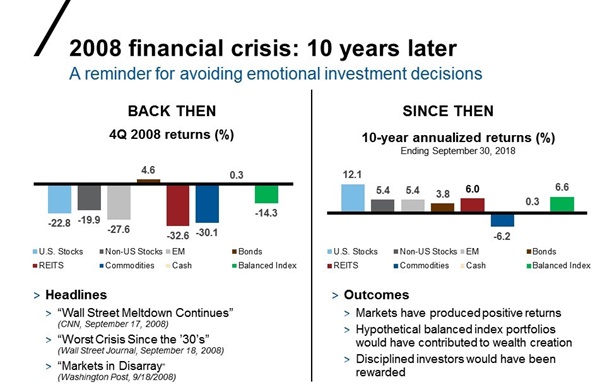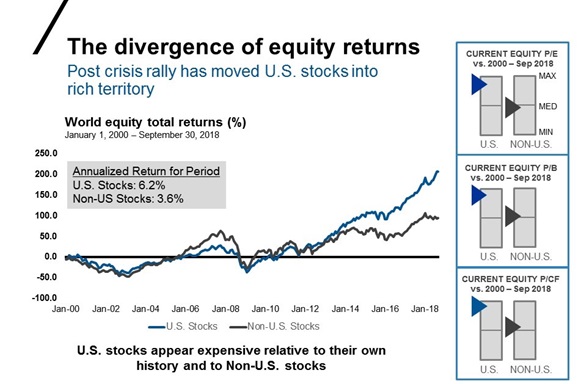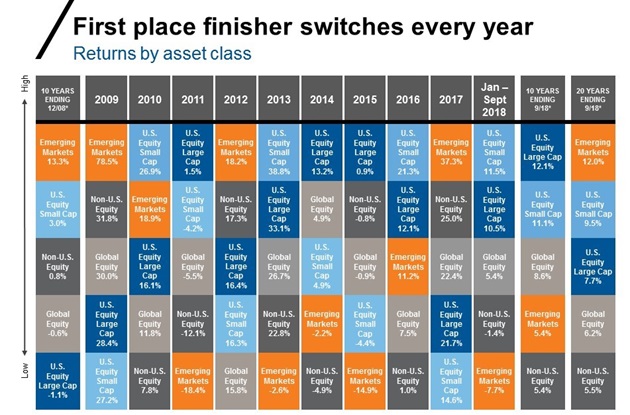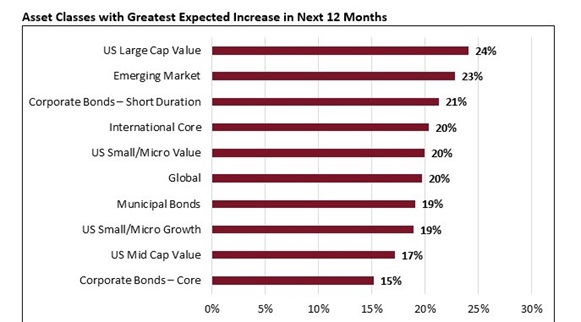Will 2019 be the year non-U.S. markets take the lead?
Many investors may be wondering if an internationally diversified portfolio is still important in 2018. Some may think investing outside of U.S. borders is too complicated and risky. They may not grasp the nuances of currencies--and feel more comfortable investing in their more familiar home country. After all, since 2008, the U.S. stock market has led the rest of the world. But, as we all know too well in this industry, past performance does not guarantee future results. With this in mind, let's go under the covers and explore the potential pros to a globally diversified portfolio.

Source: US Equity: Russell 3000 Index, Non-U.S. Equity - MSCI EAFE Index; Global Equity - MSCI World Index; Emerging Markets - MSCI Emerging Markets Index; Global Real Estate - FTSE NAREIT All Equity Index (1/1/1995-2/18/2005) & FTSE EPRA/NAREIT Developed Index (2/18/2005-9/30/2018); Cash - Bloomberg US Treasury Bill 1-3 Month, U.S. Bonds - Bloomberg U.S. Aggregate Bond Index; Balanced: 30% Russell 3000® Index; 35% Bloomberg U.S. Aggregate Bond Index; 20% MSCI EAFE Index; 5% MSCI Emerging Markets Index; 5% FTSE EPRA/NAREIT Developed Index; 5% Bloomberg Commodity Index. Index returns represent past performance, are not a guarantee of future performance, and are not indicative of any specific investment. Indexes are unmanaged and cannot be invested in directly.
The benefits of being globally diversified
At Russell Investments, we believe an internationally diversified portfolio is critical to long-term success. Why? Simply put, we see the old adage of do not put all of your eggs in one basket as still very much relevant in today's market environment. We believe diversification has several benefits: it helps to lower risk protect capital, and, over the long-term, should help to provide better returns than a single asset class portfolio. Last but not least, it also helps lessen the emotional rollercoaster that can be involved with investing in a single asset class or stock.
In a recent podcast, my colleagues Sophie Antal Gilbert and Mark Eibel talk about why diversification still matters--specifically why it is important to include non-U.S. markets as part of a diversified portfolio. They discuss the importance of buying an asset while its price/valuation are low, and selling while its price is high. Right now, I don't think anyone would disagree that U.S. equity valuations are at record highs, and thus very expensive. International markets, on the other hand, are cheaper and, according to Eibel, also fundamentally solid.

Sources: U.S. Equity -- Russell 3000® Index; MSCI EAFE Index; P/E -- Price to Earnings, P/B -- Price to Book, P/CF -- Price to Cash Flow. Blue and gray triangles represent current readings for U.S. Equity and Non-U.S. Developed Equity, respectively. Index returns represent past performance, are not a guarantee of future performance, and are not indicative of any specific investment. Indexes are unmanaged and cannot be invested in directly
Here in the U.S., the U.S. Federal Reserve (the Fed) has been raising interest rates on a consistent basis over the past several years. With rates continuing to increase, we believe U.S. equities will have more competition from bonds and international equities going forward. Why? In Europe, for example, the central bank has not yet started to raise rates, with quantitative easing remaining in place through year's end.
Additionally, 2018 was in part another good year for U.S. equities due to tax reform--which helped further lift corporate earnings. As the effects of fiscal stimulus in the U.S. start to wane heading into next year, it's worth pondering if 2019 will be able to over-deliver, to the tune of 2018. And what about 2020--two years removed from the Tax Cuts and Jobs Act? Absent a crystal ball, no one has an obvious answer to this. This gets back to why we think being globally diversified helps in times of uncertainty--as it spreads the associated risks across various markets.

*Annualized return. Non-U.S. Equity - MSCI EAFE Index; Global Equity - MSCI World Index; Emerging Markets - MSCI Emerging Markets Index; U.S. Equity Large Cap - Russell 1000® Index. U.S. Equity Small Cap - Russell 2000® Index. Please note that this chart is based on past index performance and is not indicative of future results. Indexes are unmanaged and cannot be invested in directly. Index performance does not include fees and expenses an investor would normally incur when investing in a mutual fund. Diversification and strategic asset allocation do not assure profit or protect against loss in declining markets.
Is now the time to consider international markets for added diversification in 2019?
Looking at a recent research report from the FUSE Research Network LLC , we see that others are also casting their gaze toward international markets for added diversification in 2019. According to FUSE's Clark Davis, "Non-U.S. equity portfolio diversification will be a key initiative in 2019 as advisors plan to add to their emerging market, international core, and global allocations".1 The FUSE data finds that U.S. investors, on average, have about 20% of their allocation in non-U.S. markets, when compared to approximately 30% for institutional investors. FUSE notes that this trend is shifting as investors looking for diversification and reduced risk have already moved over $300 billion in inflows into international equities.

Source: FUSE 2018 Product Usage: The Advisor View
In this chart from FUSE, the company forecasts emerging markets to experience a 23% increase in inflows over the next 12 months. Not far behind is international core, which FUSE predicts will see a 20% gain. Additionally, FUSE is expecting U.S. large cap value stocks to see a 24% increase. Importantly, all three of these top equity forecasts contrast with the dominance of U.S. large cap growth stocks over the last three calendar years. As we at Russell Investments have been saying for some time, the U.S. equity market is expensive, and growth stocks are one of the principle reasons why. If the FUSE research is correct, U.S. investors are starting to realize how expensive the U.S. equity market is--and are looking to U.S. value stocks, as well as to international and emerging markets, to diversify their portfolios and reduce overall risk.
The bottom line
As 2018 comes to a close, we must ponder if the U.S.-led rally in market performance can continue indefinitely. Will 2019 be the year that non-U.S. markets take the lead? While we don't know for sure when the market leadership will change, with the high valuations that currently accompany U.S. stocks, we believe it is essential for the long-term success of your portfolio to be globally diversified.
Read our related blog posts, Part 1and Part 2, or listen to the complete podcast on global diversification today
1 Source: Fuse Research, November 7, 2018: Non-US Equity Strategies Feature Prominently in Advisor Allocation Plans for 2019.